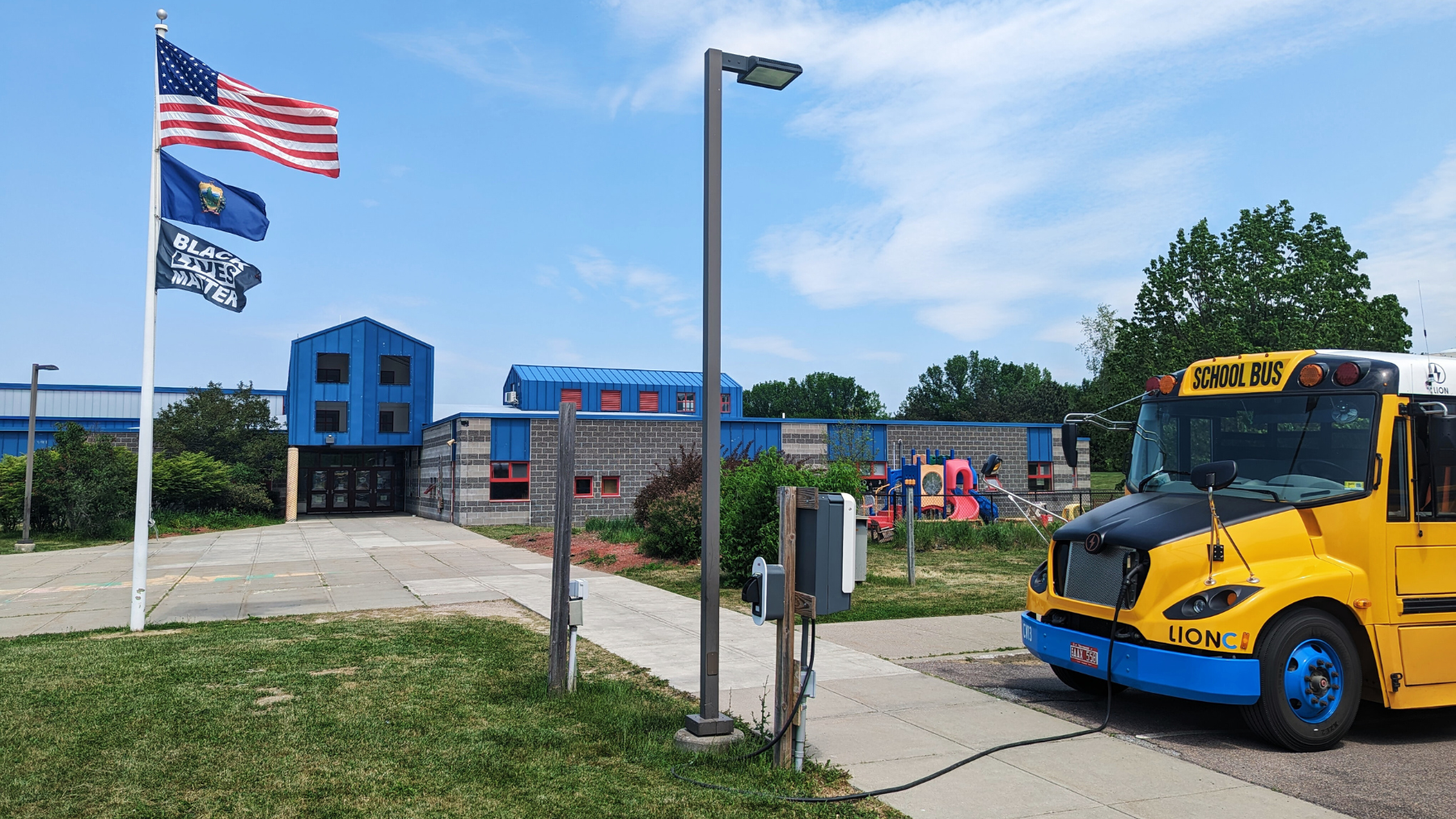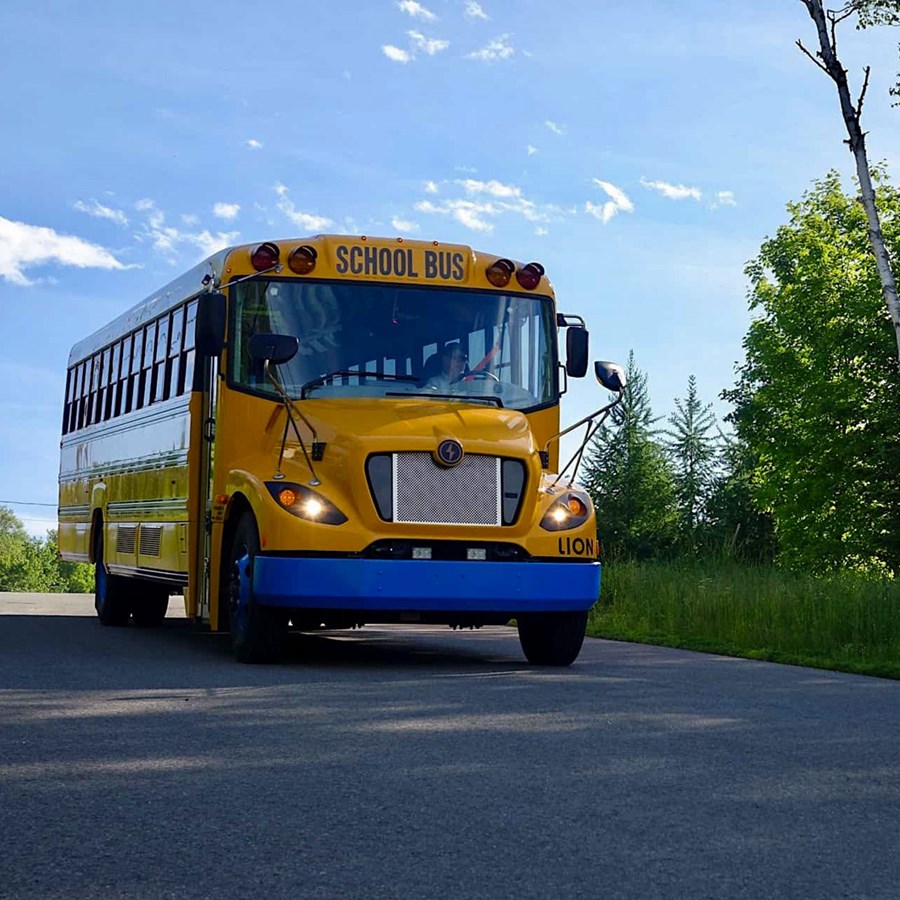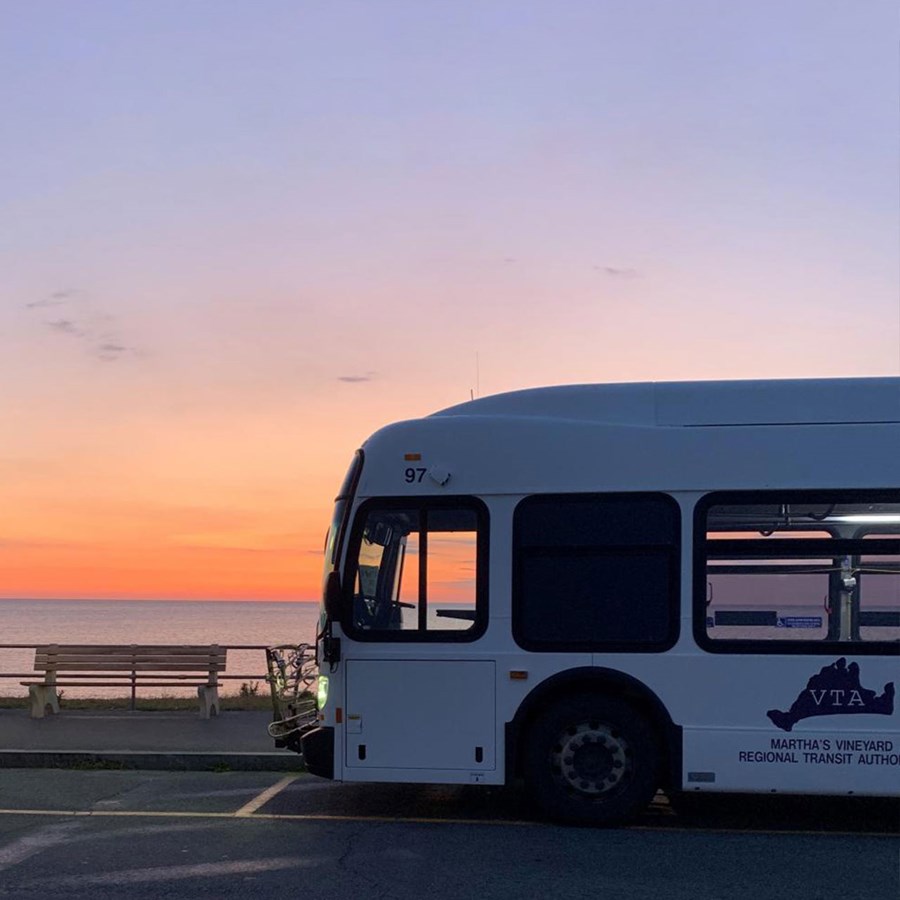What does it take to bring electric buses to school districts and transit agencies in cold climates?

The Challenge
With cold, snowy winters and hilly terrain, the State of Vermont wanted to understand whether electric buses could meet the operational needs of its school districts and transit agencies and whether these buses would reduce costs and lower harmful emissions.
The Solution
Funded by Volkswagen Settlement funds, the Vermont Department of Environmental Conservation—part of the Agency of Natural Resources—partnered with VEIC to design a pilot program to test the feasibility of electric buses and measure their cost and emissions impacts. Services: Transportation Electrification
The Impact
All eight electric buses in the pilot program delivered cost savings and reduced emissions compared with the diesel-powered buses they replaced. Together, the buses reduced nitrogen oxide (NOx) emissions by 880.4 pounds and GHG emissions by 112.3 U.S. tons—the equivalent of not burning 57 U.S. tons of coal every year.
Reducing Transportation Emissions to Achieve Climate Goals
A climate leader, Vermont has long recognized that converting the transportation sector to electric rather than fossil fuel powered vehicles is both an economic and an environmental imperative. The most recent data show that transportation contributed 35.6% of the State’s greenhouse gas (GHG) emissions in 2020—falling slightly behind thermal emissions from buildings because of decreased travel during the pandemic. To achieve its required climate targets, Vermont must continue working to reduce transportation emissions.
Electrifying medium and heavy-duty vehicles such as transit and school buses can make a big impact on emissions, but electric buses tend to cost two to three times more upfront than their diesel counterparts. Even when lifetime operating costs are lower, it can be challenging for school districts and transit agencies to fund the initial purchase. In addition, fleet managers are more familiar with diesel technology and often have questions about the operational feasibility of electric vehicle technology.

Vermont’s share of the Volkswagen Settlement Fund created an opportunity to mitigate the harmful effects of diesel emissions, especially nitrogen oxides (NOx), provide funding to reduce the upfront costs of the buses, evaluate the operational effectiveness of electric buses in Vermont, and increase familiarity with electric bus technologies across the state.
In a competitive bidding process, Vermont’s Department of Environmental Conservation (DEC) selected VEIC to administer a pilot program to test the feasibility of electric buses in Vermont and provide quantifiable data on both cost savings and emissions reductions.
“Before launching this pilot, we did not know how heavy-duty electric vehicles might perform in Vermont—especially with our cold winters and hilly dirt roads. The report on this pilot program will help us assess if deploying electric buses statewide is cost-effective and feasible long-term, and, if so, how best to deploy electric buses to maximize their benefits.”
A Pilot Program to Test Electric Buses
With deep experience leading pilot projects for new technology, VEIC solicited statewide participation for the pilot and coordinated a selection process which identified four qualified partners—one transit agency and three school districts.

Each participant committed to scrapping two older diesel-powered buses—2009 engine model year or older—and replacing them with new electric buses. Participants also agreed to install charging equipment and collaborate in the data collection process to ensure accurate analysis of bus performance.
VEIC facilitated the procurement of buses and charging equipment, coordinated closely with government agencies to ensure compliance, and worked with utilities whenever new charging equipment required electrical upgrades at the facility. Throughout the pilot, the team worked closely with vendors and service providers to resolve the delivery, installation, and performance issues that arose. Implementing new technology and systems isn’t always straightforward, but working with an experienced technical advisor can help overcome barriers and maximize benefits.
“We weren’t sure that electric buses would be adequate to meet the demands of our transportation schedule, but we were intrigued by the benefits and wanted to try them out. VEIC made it easy to enroll in the pilot and we were fortunate to have their expert advice and engagement throughout the project. It would have been difficult to get started with electric buses without this support.”
Electric Buses Reduce Emissions, Reduce Costs, and Work in Vermont
Working closely with partners, the team compiled real-world performance data across many parameters and used overlapping data-collection techniques to cross check findings. In the end, each bus had at least 12 months of results, covering all weather and driving conditions.

Using standard calculation techniques, scientific formulas, and environmental scaling factors from the Argonne National Lab Alternative Fuel Life-Cycle Environmental and Economic Transportation (AFLEET) Tool, the team analyzed energy consumption, distances travelled, battery state of charge, maintenance reports and costs, weather conditions, electric utility and diesel pricing, and data compiled in driver’s logs.
The results were striking. While some districts found electrification of buses a smoother process than others, every pilot participant realized fuel cost savings and greater efficiency from electric buses. The pilot also generated important real-world insights into cold-weather performance and operational effectiveness.
The best performing electric school bus reduced fuel and maintenance costs by over $8,000 per year compared to a diesel bus, and will save more than 11 U.S. tons of GHG emissions annually. With the higher mileage and poorer fuel economy of diesel transit buses, the best performing electric transit bus saved even more—nearly $15,000 per year in fuel costs and GHG reductions exceeding 45 U.S. tons.
“Now that we have some experience with electric buses and understand the benefits they can provide, we have applied for funding to add more into our fleet.”
Best Practices to Inform Electric Bus Deployments
In addition to demonstrating feasibility of electric buses in Vermont, the pilot program provided critical insights that can inform future electric bus deployments. From identifying top performing cold weather vehicles to evaluating and siting charging equipment, estimating timelines, and delivering effective driver training—this pilot generated insights that can facilitate successful electric bus deployment for transit agencies, school districts, and school bus contractors. Click here to read the full report.



